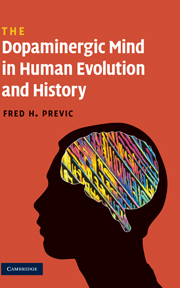Book contents
7 - Relinquishing the dopaminergic imperative
Published online by Cambridge University Press: 27 July 2009
Summary
It would be a dramatic understatement to say that we are at a turning point in human history. Not only for the first time in our history are humans being forced to use increasingly expensive energy resources and raw materials from depleted terrestrial and aquatic resources (Duncan, 2005), but for the first time leading thinkers are beginning en masse to argue for a reconsideration of the values that have dominated human existence since the emergence of the ancient civilizations. In this final chapter, I will highlight the downside of our dopaminergically dominated past history and describe the changes that must occur in industrialized societies in particular to restore balance to our individual and societal existences. Many of the themes in this chapter echo those expressed by other leading advocates of social and environmental change such as Capra (2003), Clark (1989), Duncan (2005), Primavesi (1991), and Taylor (2005).
Even if we chose to, it is almost inconceivable that we could entirely discard our dopaminergic minds altogether, as it would mean reversing over two million years of human evolution. Although the cultural achievements of the first genetically modern humans 200,000 years ago do not appear dramatically different from Homo erectus, as is consistent with the proposed epigenetically mediated rise of dopamine over the past 100,000 years, the dopaminergic gulf between Homo habilis and its predecessors included a major physiological adaptation that presumably involved some genetic selection and would accordingly be difficult to fully recreate.
- Type
- Chapter
- Information
- The Dopaminergic Mind in Human Evolution and History , pp. 155 - 172Publisher: Cambridge University PressPrint publication year: 2009

